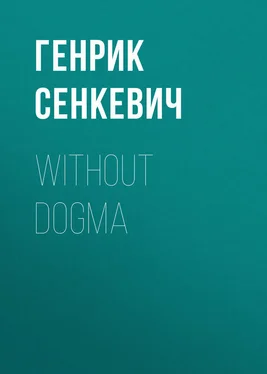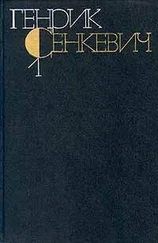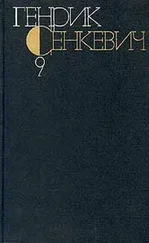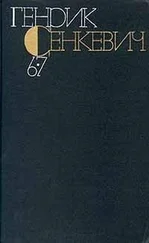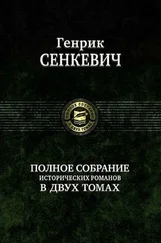Генрик Сенкевич - Without Dogma
Здесь есть возможность читать онлайн «Генрик Сенкевич - Without Dogma» — ознакомительный отрывок электронной книги совершенно бесплатно, а после прочтения отрывка купить полную версию. В некоторых случаях можно слушать аудио, скачать через торрент в формате fb2 и присутствует краткое содержание. Жанр: foreign_antique, foreign_prose, на английском языке. Описание произведения, (предисловие) а так же отзывы посетителей доступны на портале библиотеки ЛибКат.
- Название:Without Dogma
- Автор:
- Жанр:
- Год:неизвестен
- ISBN:нет данных
- Рейтинг книги:4 / 5. Голосов: 1
-
Избранное:Добавить в избранное
- Отзывы:
-
Ваша оценка:
- 80
- 1
- 2
- 3
- 4
- 5
Without Dogma: краткое содержание, описание и аннотация
Предлагаем к чтению аннотацию, описание, краткое содержание или предисловие (зависит от того, что написал сам автор книги «Without Dogma»). Если вы не нашли необходимую информацию о книге — напишите в комментариях, мы постараемся отыскать её.
Without Dogma — читать онлайн ознакомительный отрывок
Ниже представлен текст книги, разбитый по страницам. Система сохранения места последней прочитанной страницы, позволяет с удобством читать онлайн бесплатно книгу «Without Dogma», без необходимости каждый раз заново искать на чём Вы остановились. Поставьте закладку, и сможете в любой момент перейти на страницу, на которой закончили чтение.
Интервал:
Закладка:
Among my schoolfellows, whose sympathies were naturally with Don Carlos, I henceforth passed as a hero; and as I was at the same time one of the foremost pupils, my position as the first at school was beyond dispute. I was growing up with the conviction that later on, in a larger sphere, it would be the same. This opinion was shared by my teachers and schoolfellows; and yet the fact is that many of my schoolfellows who at one time would not have dreamed of competing with me, occupy to-day in France high places in literary, scientific, and political spheres; whereas I, had I to choose a profession, should feel considerably perplexed. My social position is excellent. I possess independent means from my mother's side, shall inherit my father's fortune in time to come, and administer the Ploszow estate more or less wisely, as the case may be; but the very limitation of the work excludes all hope of distinguishing myself in life, or playing any prominent part in it.
I shall never be a great administrator or agriculturist; for though I do not mean to shirk my duties, I could not devote my whole life to them, – for the simple reason that my aspirations aim much higher. Sometimes I ask myself whether we Ploszowskis do not delude ourselves as to our abilities. But if such were the case, the delusion would be only personal; other people, strangers, could not be deceived in the same way. Besides, I know that my father is an extraordinarily gifted man. As to myself, I will not enter more fully on the subject, as it might appear mere boastfulness; nevertheless I have the conviction that I could be something infinitely greater than I am.
For instance, at Warsaw (my father and my aunt wished me to enter the university there) Sniatynski and I were fellow-students. We both were drawn towards literature, and tried our hand at it. I do not say I was looked upon as the more gifted of the two, but the truth is that my work then was considered better and more promising than Sniatynski's. Sniatynski has for some years past occupied a prominent position in literature, and I am still the greatly promising Pan Ploszowski, of whom here and there people are wont to say: "If he would only take up something!"
Ah! there is the rub, – "if he would!" But they do not seem to take it into account that one has to know how to will. I thought sometimes that if I had no means of subsistence I should have to work. Certainly I should have to do something in order to earn my bread; but even then I am firmly convinced I should not derive the twentieth part of advantage from my capacities. Besides, such men as Darwin or Buckle were rich; Sir John Lubbock is a banker; most of the known men in France are in easy circumstances. This proves that wealth is not a hindrance, but rather a help towards attaining a proper standing in the chosen field of labor. I confess that, as far as I am concerned, it has done me some service, as it preserved my character from many a crookedness poverty might have exposed it to. I do not mean by this that I have a weak character, – although struggle for existence might have made it stronger; but still I maintain that the less stony the road, the less chance of a fall. It is not owing to constitutional laziness, either, that I am a nullity. I possess alike a great facility for acquiring knowledge, and a desire for it; I read much, and have a good memory. Perhaps I could not summon energy enough for a long, slow work, but the greater facility ought to serve instead; and besides, there is no urgent necessity for me to write encyclopedias, like Littré. He who cannot shine with the steady light of a sun might at least dazzle as a meteor. But oh! that nothingness of the past, – the most probable nothingness of the future! I am growing peevish – and tired; and will leave off writing for to-day.
ROME, 10 January.
Last night, at Count Malatesta's reception, I heard by chance these two words: "l'improductivité Slave." I experienced the same relief as does a nervous patient when the physician tells him that his symptoms are common enough, and that many others suffer from the same disease. I have many fellow-sufferers, not only among other Slavs, a race which I know but imperfectly, but in my own country. I thought about that "improductivité Slave" all night. He had his wits about him who summed the thing up in two words. There is something in us, – an incapacity to give forth all that is in us. One might say, God has given us bow and arrow, but refused us the power to string the bow and send the arrow straight to its aim. I should like to discuss it with my father, but am afraid to touch a sore point. Instead of this, I will discuss it with my diary. Perhaps it will be just the thing to give it any value. Besides, what can be more natural than to write about what interests me? Everybody carries within him his tragedy. Mine is this same "improductivité slave" of the Ploszowskis. Not long ago, when romanticism flourished in hearts and poetry, everybody carried his tragedy draped around him as a picturesque cloak; now it is carried still, but as a jaegervest next to the skin. But with a diary it is different; with a diary one may be sincere.
ROME, 11 January.
The few days which remain to me before my departure I will use in retrospects of the past, until I come to note down day after day the events of my present life. As I said before, I do not intend to write an autobiography; who and what I am, my future life will show sufficiently. I should not like to enter into minute details of the past, – it is a kind of adding number to number, and a summing up. I always hated the four rules of arithmetic, and especially the first. But I want to have a general idea of the total, so as to have a clearer view of myself. Therefore I go on with the mere outline.
After having finished my studies at the university I went to an agricultural school in France. The work there was easy enough, but it had no special attraction for me. I did it as one who knows that this special branch of knowledge will be useful to him, but at the same time feels that he lowers himself to it and that it does not respond either to his ambition or his faculties. I derived a twofold gain from my sojourn there. Agriculture became to me familiar enough to protect me from being cheated by any agents or bailiffs, and it strengthened my frame so that it could withstand the life I later on led in Paris.
The years following I spent either in Koine or in Paris, not to mention short stays at Warsaw, where my aunt summoned me now and then in order to introduce me to some special favorite of hers with a view to matrimony.
Paris and its life attracted me greatly. With the truly excellent opinion I had then of myself, with more confidence in my intelligence and the self-possession an independent position gives, I still played a very unsophisticated part on this scene of the world. I began by falling desperately in love with Mademoiselle Richemberg of the Comédie Française, and absolutely insisted upon marrying her. I will not dwell now upon the many tragicomic imbroglios, as I am partly ashamed of those times, and partly inclined to laugh at them. Still later on it happened that I took counterfeits for pure gold. The French women, and for the matter of that, my own countrywomen, of whatever class and in spite of all their virtues when young, remind me of my fencing lessons. As the fencer has his hour of practice with the foils so as to keep his hand in, so women practise with sentimental foils. As a mere youth, fairly good looking, I was sometimes invited to a passage of arms, and as I took the matter seriously, received many a scratch. They were not mortal wounds and healed quickly. Besides, everybody has to pay for his apprenticeship in this world, especially in a world like that. My time of probation was, comparatively speaking, a short one. Then came a period one might call "la revanche." I paid back in the same coin, and if now and then I was still taken in, it was with my eyes open to the fact.
Читать дальшеИнтервал:
Закладка:
Похожие книги на «Without Dogma»
Представляем Вашему вниманию похожие книги на «Without Dogma» списком для выбора. Мы отобрали схожую по названию и смыслу литературу в надежде предоставить читателям больше вариантов отыскать новые, интересные, ещё непрочитанные произведения.
Обсуждение, отзывы о книге «Without Dogma» и просто собственные мнения читателей. Оставьте ваши комментарии, напишите, что Вы думаете о произведении, его смысле или главных героях. Укажите что конкретно понравилось, а что нет, и почему Вы так считаете.
